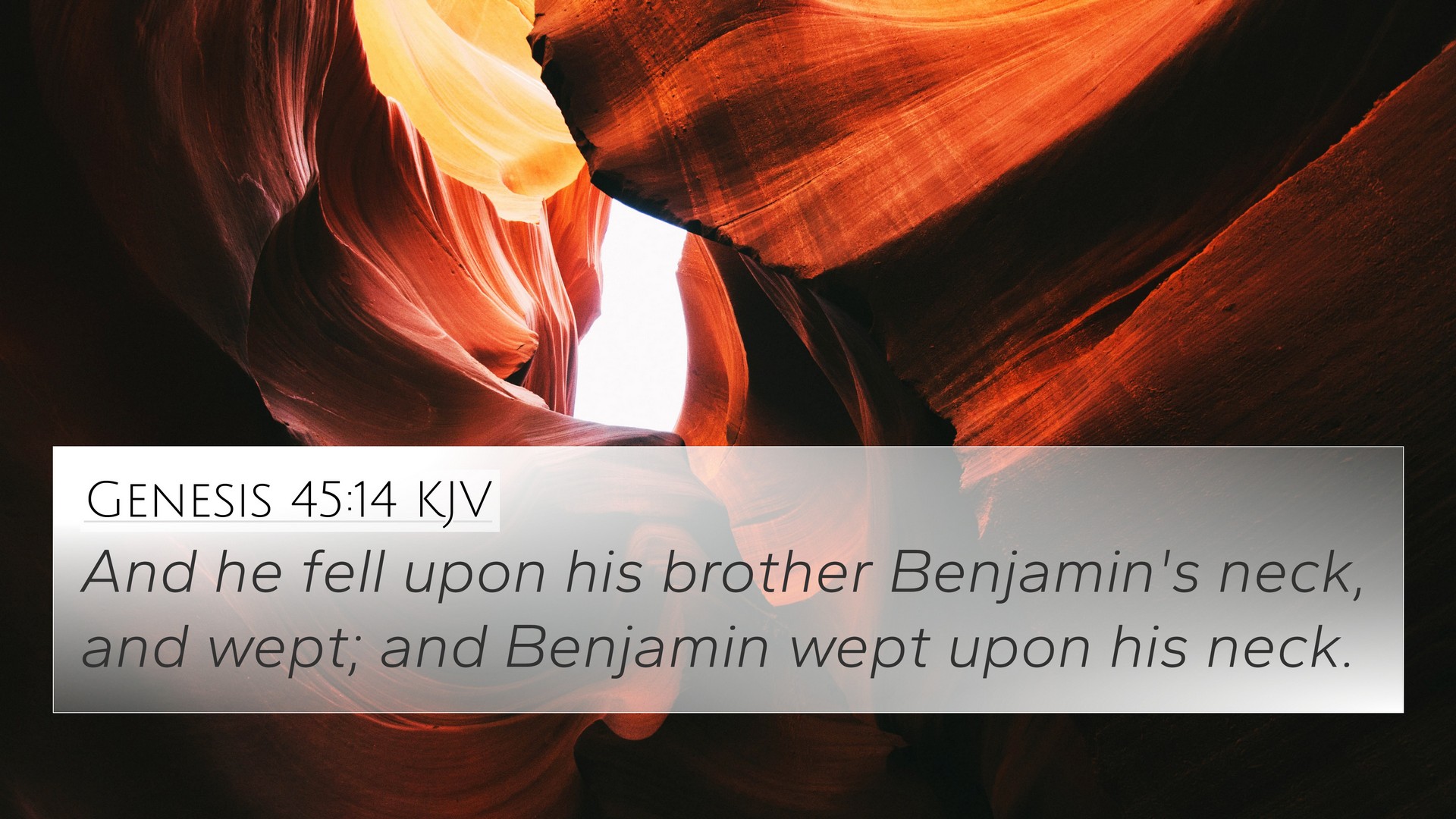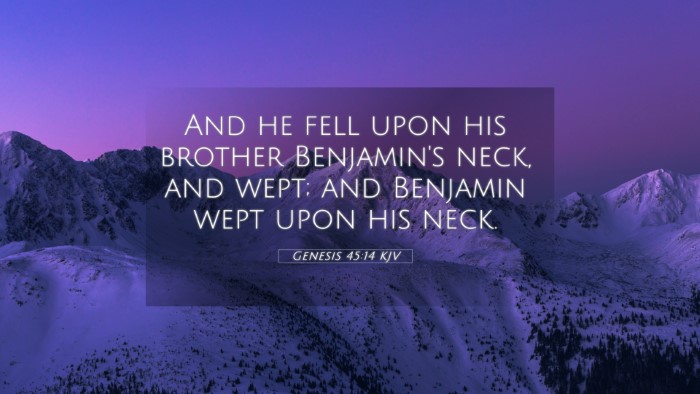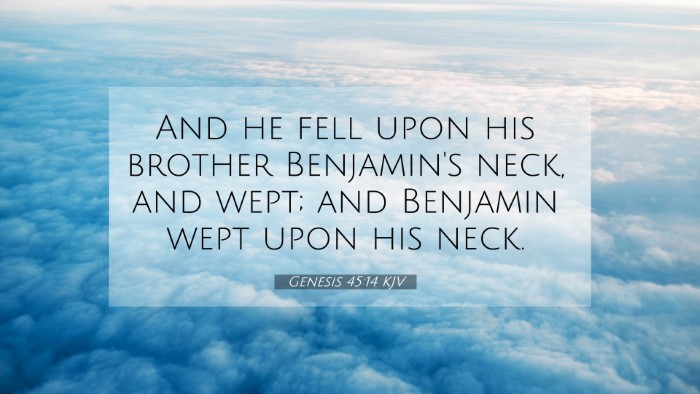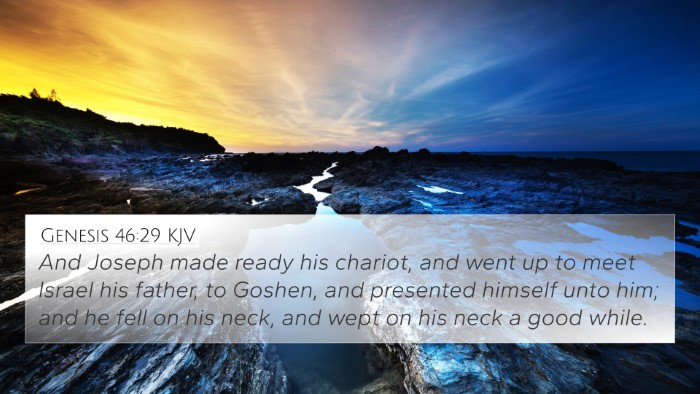Genesis 45:14 Meaning and Commentary
Genesis 45:14 reads: "And he fell upon his brother Benjamin's neck, and wept; and Benjamin wept upon his neck." This verse represents a poignant moment of reconciliation and emotional release following a prolonged period of familial separation and tension.
Overview of Genesis 45
- In Genesis 45, we witness Joseph revealing his identity to his brothers, who had sold him into slavery years earlier. This revelation constitutes a key turning point in the narrative.
- The emotional exchange between Joseph and Benjamin illustrates the themes of forgiveness, compassion, and familial love.
- The verse encapsulates the broader idea of redemption and healing in relationships, central to the Biblical narrative.
Insights from Commentaries
Matthew Henry's Commentary provides a detailed reflection on the significance of this emotional reunion. He emphasizes:
- The depth of Joseph's love for Benjamin, which symbolizes the unconditional love in family relationships.
- The act of weeping indicates not just sorrow for past wrongs, but also joy in restored relationships and the grace of forgiveness.
- This moment serves as an illustration of God's powerful work in turning intended evil into profound good, fulfilling His purpose through hardship.
Albert Barnes' Notes on the Bible further explores the dynamics at play:
- He notes the cultural significance of embracing and weeping as a form of expressing deep emotional bonds and reconciliation in ancient Near Eastern customs.
- Barnes draws attention to the role of Benjamin as the favored son, paralleling themes of favoritism present in Joseph's earlier story.
- Joseph's emotional response indicates a deeper understanding of loss and the enduring impact of family ties, which transcends personal betrayal.
Adam Clarke's Commentary adds additional layers of meaning by focusing on:
- The theological implications of restoration in the biblical narrative. This encounter reflects not only personal reconciliation but also serves as a foreshadowing of God's redemptive work among His people.
- Clarke emphasizes the importance of forgiveness, depicting Joseph as a type of Christ who ultimately forgives those who wronged him and seeks their restoration.
- The idea that real strength is found in vulnerability, as demonstrated by Joseph's tears, resonates with both psychological and spiritual understandings of healing.
Cross-References to Genesis 45:14:
- Genesis 37:34-35 - Jacob's grief over Joseph's supposed death parallels the sorrow experienced in family estrangement.
- Luke 15:20 - The father’s embrace of the prodigal son parallels Joseph's embrace of Benjamin, illustrating divine forgiveness.
- Psalms 133:1 - The joy of unity among brethren reflects the joy experienced in this reunion.
- 2 Corinthians 5:18 - Highlights reconciliation, an important theme resonating throughout both Old and New Testament teachings.
- Ephesians 4:32 - Encourages kindness and forgiveness, echoing the spirit of Joseph's actions.
- Romans 8:28 - God's ability to bring good from painful circumstances connects to Joseph's narrative.
- Hebrews 11:22 - References Joseph's faith in God’s plans, emphasizing hope despite past trauma.
- Matthew 5:44 - Encourages love for enemies, which Joseph exemplifies by showing mercy to his brothers.
- Colossians 3:13 - Advocates for forgiveness, reflecting the spirit of Joseph's reunion with his brothers.
- Acts 7:9-10 - Context of Joseph’s story provides insight into the overarching narrative of deliverance and faithfulness.
Thematic Connections
This verse exemplifies the thematic connections throughout Scripture regarding family, betrayal, forgiveness, and divine providence. It invites deeper exploration into how these themes manifest across different books of the Bible.
By utilizing tools for Bible cross-referencing, one can uncover the intricate ways in which scriptures interact and highlight shared themes. The practice of Bible cross-reference study methods allows believers to build a comprehensive understanding of Biblical principles and narratives.
Conclusion
The emotional moment captured in Genesis 45:14 reveals profound theological truths and deep familial bonds. By understanding this verse in the context of the broader Biblical narrative through cross-referencing, we enrich our comprehension of God's work in reconciliation and the overarching story of redemption.






